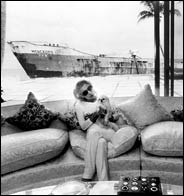 Apparently, the project went into turnaround when Mollie Wilmot objected to being portrayed by Bette Midler or Melanie Griffith. Disney executives may be smiling through their tears to learn that Wilmot, "the socialite with the oversize white sunglasses who rose to celebrity in 1984 when a tanker ran aground at her Palm Beach, Fla., mansion," has passed away.
Apparently, the project went into turnaround when Mollie Wilmot objected to being portrayed by Bette Midler or Melanie Griffith. Disney executives may be smiling through their tears to learn that Wilmot, "the socialite with the oversize white sunglasses who rose to celebrity in 1984 when a tanker ran aground at her Palm Beach, Fla., mansion," has passed away.
In the NYTimes obit, the subject is Mrs Wilmot's life in the media, especially in the paper itself. In addition to covering the unexpected arrival of the Venezuelan tanker and her crew ( "'I thought it was the man who was coming to photograph my home for Town & Country,'") The Times, we learn, dutifully reported on her clothing (1990: "watermelon-pink Yves Saint Laurent silk suit to lunch in the Saratoga racing season.") and her spats with decorators (1985: "Mrs. Wilmot stormed out of the [Winter Antique] show, followed by the commode."). All the life that's fit to print.
Perusing obituaries from her "principal residence," Palm Beach, we find recollections of neighbors and shopkeepers and sense the nuances of local priorities. The proud townie Sun-Sentinel: "In addition to being 'zany,' Wilmot was not 'snotty or snobby' like some Palm Beach residents, ["neighbor" Dale] Merck said. Rather, she was an original Palm Beacher." The striving Post: "And it was common knowledge that Mrs. Wilmot turned down Prince Charles and Princess Diana's invitation to a ball." The appropriate Daily News: "Mrs. Wilmot -- previously Bragno and Bostwick -- was divorced from New York publicist Paul Wilmot, whom she married in December 1970 at her North Ocean home designed by Maurice Fatio. Mary Sanford was her matron of honor."
While they recount life of their subject, obituaries are clearly (is this obvious?) for the living. They may be oblique tools for social control, but their power on the individual is undeniable. By judging Mrs Wilmot as "a real Palm Beacher," a higher plane than that occupied by mere "Palm Beach residents," the obit writer fires a clear shot across the bows of the still-too-new yachts in the marina.
Obituary fixation may be dismissed as absurd minutiae (first line, font size, picture or no, A1 lede? if only...), but preoccupation with one's place in history, one's contribution to the world, is at least as old as the pyramids.
 Warren Schmidt is a bereft ex-actuary in Alexander Payne's highly acclaimed film, About Schmidt, where he's faced with cold calculations of the worth of his own life. Payne is rightly praised in this Times review from the NY Film Festival for "laying out an expansive, impressively even-handed vision of life in contemporary Middle America." Reviewer Stephen Holden goes on: "The movie's quest to discover how one ordinary person can make more of a difference turns out to be as serious as its title character's. The common-sense answer it comes up with, in a final scene so unassuming that it's almost a throwaway moment, is as simple and modest as it is profoundly moving."
Warren Schmidt is a bereft ex-actuary in Alexander Payne's highly acclaimed film, About Schmidt, where he's faced with cold calculations of the worth of his own life. Payne is rightly praised in this Times review from the NY Film Festival for "laying out an expansive, impressively even-handed vision of life in contemporary Middle America." Reviewer Stephen Holden goes on: "The movie's quest to discover how one ordinary person can make more of a difference turns out to be as serious as its title character's. The common-sense answer it comes up with, in a final scene so unassuming that it's almost a throwaway moment, is as simple and modest as it is profoundly moving."
I never met Mrs. Mollie Wilmot, although her acolytes (a few generations removed) are thick as fiddlers around here. In April, I met Payne, whose intelligence and niceness impressed me as much as his films. With all due respect to the doyennes of Palm Beach, I suggest taking your life cues from the story of Warren Schmidt.












